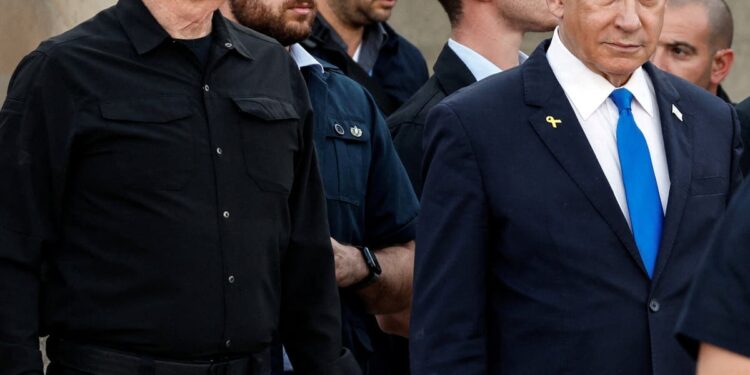The International Criminal Court on Thursday issued arrest warrants for Prime Minister Benjamin Netanyahu of Israel and the former Israeli defense minister, Yoav Gallant, for crimes against humanity and war crimes in the Gaza Strip.
Karim Khan, the court’s chief prosecutor, had requested the arrest warrants in May for the two Israelis, alongside three top Hamas officials. Israel has fiercely contested the court’s allegations, which include the use of starvation as a weapon of war and “intentionally directing an attack against the civilian population.”
The court on Thursday also issued a warrant for the arrest of Muhammad Deif, Hamas’s military chief, for crimes against humanity, including murder, hostage taking and sexual violence.
Israel said in August that it had killed Mr. Deif. Mr. Khan had also sought arrest warrants for Yahya Sinwar, the leader of Hamas, and Ismail Haniyeh, another top figure in the militant group, both of whom were later killed by Israel.
The warrants added to Israel’s declining legitimacy on the world stage, where it has faced increasingly fierce condemnation over its conduct of the war against Hamas in Gaza.
Israel insists that it fights in accordance with the international laws of war.
Just two weeks ago, Netanyahu fired Gallant over differences on strategy for the Gaza war, a move that set off protests across Israel. Gallant had been pushing for an immediate cease-fire deal in Gaza that would secure the release of hostages held there.
His dismissal removed the main proponent in the Israeli government for such an agreement.
Netanyahu’s office condemned the I.C.C.’s decision to issue arrest the warrants, rejecting what it described as the court’s “absurd and false accusations.
“Prime Minister Benjamin Netanyahu will not surrender to the pressures,” the Israeli leader’s office said in a statement.
“He will not recoil or withdraw until all of the war’s goals — that were set at the start of the battle — are achieved.”
One practical consequence of an I.C.C. arrest warrant: It will complicate Netanyahu’s travel. President Vladimir V. Putin of Russia has severely curtailed his trips abroad since the I.C.C. issued a warrant for his arrest last year in relation to the invasion of Ukraine.
Putin has only tested the warrant once — in September, when he visited Mongolia, a country highly dependent on Russia.
Izzat al-Rishq, a senior Hamas official, said in a statement that whether or not the two Israelis were arrested, “the truth that has been revealed is that international justice is with us and against the Zionist entity,” a reference to Israel.
He did not immediately comment on the warrant for Muhammad Deif, the Hamas military chief.
Human Rights Watch welcomed news of the arrest warrants and said they “break through the perception that certain individuals are beyond the reach of the law.”
Balkees Jarrah, associate international justice director at the organization, said the I.C.C.’s effectiveness “will depend on governments’ willingness to support justice no matter where abuses are committed and by whom,” adding: “These warrants should finally push the international community to address atrocities and secure justice for all victims in Palestine and Israel.”
The I.C.C. prosecutor had sought warrants for 3 Hamas leaders. At least 2 were killed.
The court’s chief prosecutor initially sought arrest warrants for three Hamas leaders.
The International Criminal Court on Thursday issued an arrest warrant for a single Hamas official — not three as the chief prosecutor had initially sought in May.
That’s because two of them have since been killed.
Karim Khan, the court’s chief prosecutor, requested the warrants after investigating Hamas’s attack on Israel in October 2023 and Israel’s subsequent bombardment and invasion of Gaza.
In May, Mr. Khan asked the court to issue warrants for Hamas’s top leader in Gaza, Yahya Sinwar; its political leader, Ismail Haniyeh; and its military chief, Muhammad Deif.
He accused them of war crimes and crimes against humanity for the killing of civilians and the capture of hostages during the October 2023 attack, as well as maltreatment of and sexual violence against hostages during their captivity in Gaza.
The requests required approval by judges from the I.C.C., the world’s top criminal court. That took months.
In the meantime, Mr. Haniyeh was assassinated in the Iranian capital, Tehran, in July, a killing widely attributed to Israel.
The court subsequently announced that it had terminated proceedings against him.
And Israeli forces killed Mr. Sinwar in a firefight in Gaza in October.
As for Mr. Deif, Israel claimed to have killed him in an airstrike in Gaza in October. On Thursday, the court said it was “not in a position to determine whether Mr. Deif has been killed or remains alive” and was therefore issuing the warrant for his arrest.
The I.C.C.’s arrest warrants were issued as Netanyahu met with a top U.S. official pushing for a cease-fire in the war between Israel and the Lebanese militant group Hezbollah.
The warrants pertained only to Israel’s fight with Hamas in the Gaza Strip, but the conflict has expanded since they were first requested in May.
Israeli leaders criticized the decision to issue arrest warrants for Netanyahu and Gallant.
“The decision has chosen the side of terror and evil over democracy and freedom,” said Isaac Herzog, the Israeli president, accusing the court of turning “the very system of justice into a human shield for Hamas’s crimes against humanity.” Itamar Ben-Gvir, the hardline Israeli national security minister, said Israel should annex the occupied West Bank in response to the court’s decision.
Benny Gantz, an Israeli opposition leader and critic of Netanyahu, slammed the warrants as “a historic disgrace that will never be forgotten.”
Many in Israel still see the war in Gaza — launched last year in response to Hamas’s attack on southern Israel — as fundamentally just.
While Netanyahu’s opponents have criticized his government’s failure to bring home the hostages taken by Hamas in that attack, there is less criticism over the civilian toll in Gaza.
Israel is not a member of the I.C.C. and does not recognize its jurisdiction in Israel or in Gaza, so Netanyahu and Gallant will not face any risk of arrest at home.
But the warrants mean that they could be arrested if they travel to one of the court’s 124 member nations. That includes most European countries, though not the United States. (New York Times)






















